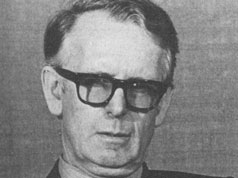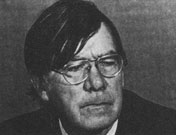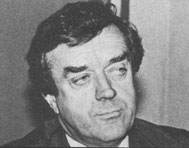The Uncivil Civil Servants: The Obstruction of Reform
In the 13 years since the Devlin Report was published on the reform of the public service, none of its recommendations have been implemented, bar the settng up of another Department. In the period, the number of public servants has doubled and the cost of their pay and pensions is not £2,391m, almost half of all public expenditure.
In 1966 the then Minister of Finance, Jack Lynch, announced in the budget speech that he was appointing a committee to review the public service and its role in the state's affairs. In 1969 the Public Service Organisation Review Group (PSORG), more commonly known after its chairman Liam St. John Devlin, presented its report to another Minister of Finance, Charles Haughey. The task of following up the recommendations of the report in the early seventies fell to two more ministers, George Colley and Richie Ryan. The lead given by the politicians, and the unanimity of agreement among them is significant in the context of the report's impact twelve years on.

The Devlin Report is regarded as one of the most important documents produced since the founding of the state. It's recommendations were considered far reaching and an essential corollary to the earlier economic programmes of the Lemass Government, particularly as the existing organisation of the public service was considered inappropriate for the management of the state's economic development. This view was more in the nature of a recognition that times were changing, and not a deprecation of the Public Services activities hitherto.
The review group conducted extensive enquiries, both at home and abroad, received numerous submissions and employed the services of professional managerial consultants. The report examined, in great depth, the origins, the historical background and the experience of the civil service, local government and the semi-state bodies. It explored the system of administration beneath Ministers and the share out of functions between departments and between departments and the satellite agencies in local government and the semi-state. The report saw two roles for the public service, firstly to serve the Government in a policy advisory capacity, and second to carry out and execute the policies selected.
The report's primary conclusion was stated as follows:
"Our review of the present structure and organisation of the public service has led us to the conclusion that the faults are largely those of institutions. Where there has been failure it has been in the reluctance to recognise the need for action on the institution as a whole." 11.9.1.
The review group's proposals can be considered, for convenience, under three headings:
Proposals concerned with the structure and organisation of the Public Service.
The report drew a sharp dividing line between policy formulation and execution, by recommending the establishment in each department of an Aireacht, a small policy advisory group centered around the minister and comprised of the senior civil servants. These bodies were to be responsible for providing general direction and control for the rest of the public service. The execution and administration of these policies was then the responsibility of the remainder of each department.
 The intention of this arrangement was to overcome the peculiarly Irish problem of constituency service, by forcing trivial matters out of the Dail and into the lower levels of the public service, thereby releasing the time and energies of ministers and senior officials for questions of major policy. The review group realised that this would require the alteration of the legal status of the minister as a corporation role, and that this would have serious implications for the notions of ministerial responsibility and accountability within the Dail. To deal with this problem the report recommended the establishment of an appellate system for administrative justice, outside and independent of the public service.
The intention of this arrangement was to overcome the peculiarly Irish problem of constituency service, by forcing trivial matters out of the Dail and into the lower levels of the public service, thereby releasing the time and energies of ministers and senior officials for questions of major policy. The review group realised that this would require the alteration of the legal status of the minister as a corporation role, and that this would have serious implications for the notions of ministerial responsibility and accountability within the Dail. To deal with this problem the report recommended the establishment of an appellate system for administrative justice, outside and independent of the public service.
Proposals that dealt with the management of the Public Service
The review group believed that the unity and cohesiveness of the public service could best be served through the creation of a more effective system of management and communication, particularly through greater staff mobility within and between departments.
The most significant proposal in this respect was the establishment of a department of the Public Service to take over the existing management function exercised by the Department of Finance, and to provide the lead within the public service towards reform. In conjunction with this and in order to upgrade and ensure more efficient centrol coordination the report recommended the creation of units within each department for the four staff functions - Planning, Organisation, Finance and Personnel.
Proposals directed at the distribution of functions between departments and between departments and other bodies.
The report proposed a number of specific redistributions. Most notable in the current context, it recommended that the Department of Fisheries be subsumed in an expanded Department of Agriculture. The report also dealt at length with the position of the semi-state bodies in the public service.
 A clear distinction was drawn between commercial and non-eommercial semi-state bodies. The problem that confronted the review group, was how to balance the autonomy that was an essential ingredient of the semi-state system with the need for some overall control by the centre. In this respect the report proposed, as far as non-eommercial bodies were concerned, that there should be periodic administrative and efficiency audits. However, the report was not as clear in deciding where the line should be drawn for commercial bodies.
A clear distinction was drawn between commercial and non-eommercial semi-state bodies. The problem that confronted the review group, was how to balance the autonomy that was an essential ingredient of the semi-state system with the need for some overall control by the centre. In this respect the report proposed, as far as non-eommercial bodies were concerned, that there should be periodic administrative and efficiency audits. However, the report was not as clear in deciding where the line should be drawn for commercial bodies.
The Review Group allowed a period of five years for the implementation of its principal recommendations. The interest shown in the report's publication was substantial and the members of the review group were given ample opportunity to explain the background and reasoning behind their recommendations. It was felt at that time that the power of the report lay "not merely in its ability to wring assent from those whom it affects but rather to inspire their enthusiasm".
In 1973, Richie Ryan, Minister of Finance at the time, put before the Dail the Ministers and Secretaries (Amendment) Bill. In the subsequent debate, which only half-a-dozen or so deputies attended, John Kelly (then Parliamentary Secretary to the Taoiseach) described the new department as only "the tip of the Devlin iceberg".
By 1975, however, the early anticipation that the flood gates on public service reform had been opened, began to fade. Dr. Noel Whelan, then assistant secretary at the Department of the Public Service, acknowledged in a review of the progress made that "while there has been much activity, there has not been widespread evidence yet of fundamental reform".
 Aside from the new department, the report had initiated the establishment of the Public Service Advisory Council (to monitor the pace and progress of public service reform), the Law Reform Commission, and the creation of the office of the Director of Public Prosecution. No doubt all these new bodies represented an important and essential step forward, but there still remained to be tackled the older and larger bulk of the public service where the problems lay.
Aside from the new department, the report had initiated the establishment of the Public Service Advisory Council (to monitor the pace and progress of public service reform), the Law Reform Commission, and the creation of the office of the Director of Public Prosecution. No doubt all these new bodies represented an important and essential step forward, but there still remained to be tackled the older and larger bulk of the public service where the problems lay.
In mitigation of the perceivable progress, Dr. Whelan argued that while the seeds had been sown, it was too early to judge whether they had fallen on barren soil. The initial hope and enthusiasm was gradually replaced by an atmosphere of frustration at the pace and extent of change. Indeed the Public Service Advisory Council itself, began to reflect the growing pessimism.
However, a number of interested individuals both within and outside the public service began a revision and re-examination of the review group's work in order to discover where the difficulties lay. It became obvious at the outset of this re-evaluation that considerable difficulty was being encountered with the implementation of the Aireacht concept. The Aireachts had been introduced into a few departments and only then at an experimental level. The argument that emanated from the Department of the Public Service was that the Devlin Report had saddled them with 'purist' notions of little practical benefit that were incapable of implementation. In particular it was felt that "the notion that at one level - that of Government departments - all policy planning should be undertaken while at the other levels - those of the various state sponsored bodies and agencies only execution of that policy should take place is not sound" (Admin. 0175(25)).
A criticism voiced extensively during the mid-seventies was that the recommendation that the whole public service into an integrated administrative system was over-ambitous and unworkable. A case can certainly be argued that the Devlin Report was over-ambitious. However, this was not so much a fault of the report, but rather an inevitable consequence of the intellectual background from which it sprung. Especially the idea, popular in the management sciences of the 1960's, that organisational strµctures and systems have an existence independent from the personnel in them.
Likewise, the adoption of many of the values of business organisation theory, that emerged from the experience of the American corporate giants such as General Motors, were considered to be inappropriate to the environment in which the public services operated.
A more appropriate criticism of the report was that it overestimated the public service's commitment to the notion of change. The passage of time has served to dispel these expectations, as the implementation of the report's proposals encountered in some cases thinly disguised opposition. In addition, the Department of the Public Service, far from being the engine of change it was originally conceived as, has become primarily, the body through which the Government negotiates with its employees. No clearer indication of the extent of the failure of reform can be had, than by reference to the fact that when the report was presented the public service numbered approximately 150,000 and today numbers just over 300,000.
Partial responsibility, in this respect, is attributed to the apparent lack of political will that existed among the nation's leading politicians in relation to public service reform. This, however, was not the case at the outset, particularly as the all-party commitment was a major force in the initiation of change. To what extent the subsequent loss of interest is due either, to the frustration experienced by ministers who actively attempted to step up the pace and extent of change, or to the lack of vision among many politicians who saw no votes in public service reform, is not clear.
 Another criticism of the Review Group's work, and one that is rarely made, is that it made no mention nor recommended any guidelines for Ireland's entry into the European Community, despite the fact that the late 60's were the years in which entry was negotiated. This omission has, for the most part, not affected those parts of the public service who deal daily with the Community, from operating in a competent fashion. If anything Community membership has had a beneficial effect on the public service by making inter-departmental cooperation a regular fact of life.
Another criticism of the Review Group's work, and one that is rarely made, is that it made no mention nor recommended any guidelines for Ireland's entry into the European Community, despite the fact that the late 60's were the years in which entry was negotiated. This omission has, for the most part, not affected those parts of the public service who deal daily with the Community, from operating in a competent fashion. If anything Community membership has had a beneficial effect on the public service by making inter-departmental cooperation a regular fact of life.
The failure to reform the public service since the Devlin report was published over 13 years ago has been a major contributor to the crisis in which we find ourselves. Politicians, who have failed also to reform their own institution, the Dail, are to blame in the first instance. But the public servants themselves, who now have the best paid and most secure employment in the state, are also very largely culpable.
Material Consulted: B.Chubb, "Gov.& Politics of Ireland" 2nd ed, ch.I2, 13, 14.; T.J.Barrington "The Irish Administrative System".; N.Whelan "Administration (1975)(23)" ; D.Kelly "Administration (27) 1979"; G.MacKechnie Administration (1977) 25" ; G.MacKechnie "Administration Management Nov.197S" ; Special edition of "Administration" Winter 1970; Public Service Advisory Council Reports No.7, No.S.
